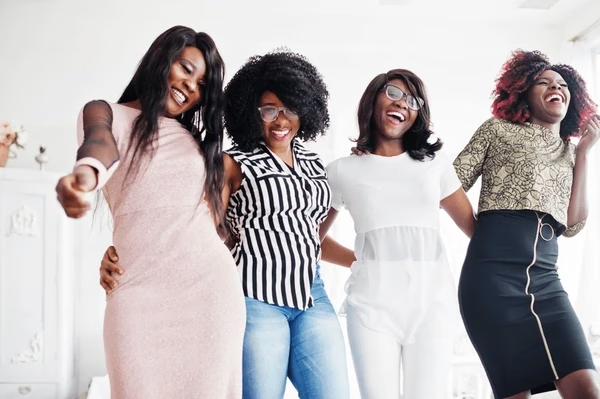The Rise Of Ladies’ Groups In The Upper East Region: Support Circles or A Silent Storm
In recent times, a growing trend has quietly swept across communities in the Upper East Region of Ghana, the formation of ladies’ groups, cliques, and in cases, what some will call “gangs” or “cults.” These groups have begun to dominate social spaces with confidence that’s hard to ignore.
These cliques involve both married and single women, often with strong social media presence and growing influence within their communities. Naturally, the formation of these groups is supposed to be a positive move. Women coming together to support each other in times of need, to form a sisterhood that offers emotional, financial, and even professional support. In a Region where women have historically been marginalized or lacked platforms to voice their challenges, these groups seem to offer a refreshing shift.
The Good: Support and Empowerment
At best, these groups are a powerful force for good. They may offer:
- Solidarity and Sisterhood: especially in times of financial distress, bereavement, outdoorings, weddings, etc.
- Community Drives: with some groups occasionally organizing charity donations, cleanup exercises, and even health awareness campaigns
These efforts, if sustained and well-structured, can contribute positively to local development and the empowerment of women in a traditionally autocratic society.
The Bad: Rivalries, Financial Pressure, and Discrimination
BUT behind the glitz of matching uniforms, branded T-shirts, and expensive gatherings lies a growing concern. Most of the cliques have become exclusionary, status-driven cliques, more focused on appearances, flamboyance, and social ranking than genuine support they claim to offer. This may create:
- Social Division, where women not part of any group feel sidelined or shamed
- Unhealthy Competition among group members, leading to tension and even public or social media callouts or confrontations
- Financial Pressure on members to keep up with group expectations, leading to debt or strained relationships at home in the case of married women.
Some reports suggest that within these groups, there’s a silent but persistent pressure to conform to dress a certain kind of way, spend a certain amount, or support questionable activities to maintain status.
The formation of these groups, especially in the way they are currently evolving in parts of the Upper East Region, can have complex impacts on husbands of women involved in them. There are growing concerns about negative and even destabilizing consequences on marriages, homes, and the male psychological well-being.
These groups demand a certain level of financial commitment, monthly dues, uniform sales, expensive outings, birthday contributions, flamboyant social media posts, and, to some extent, even carry professional Bloggers and photographers along to their events. This breeds a serious financial burden on husbands to finance these expenses, especially when their wives are unemployed.
This, as well, could create a shift in power dynamics where some women will begin to compare their husbands with other members’ partners, leading to dissatisfaction, disrespect, or pressure on the husband to do more.
In communities where modesty and discretion are valued, social embarrassment or conflict could be another headache for husbands. Men may feel embarrassed if their wives are seen in viral videos engaging in public disputes or even flashy behaviour. Such behaviors can affect a husband’s standing in society, the workplace, or among traditional leaders.
The Ugly: Cult-like Behavior and Questionable Allegiances
Most worrying, however, is the silent shift from support groups to what may be veering into cult-like or gang-style behaviour. “Cult” may sound extreme, but the signs are glaring:
- Involvement In Activities That are morally or Socially Questionable, including reports or accusations of involvement in Sugar Daddy culture, husbands’ or boyfriends’ snatchers, harassment of rivals, or manipulation of public figures.
- Power hierarchies with leaders who command excessive influence over members’ lives.
- Loyalty Oaths, in some cases, group secrecy, and punishment for betrayal.
So Should We Be Concerned?
YES, not because women are organizing. Women forming support networks is a vital part of community resilience, no doubt about that. BUT the manner in which these groups are evolving unchecked, Unregulated, and in some cases bordering on social disruption should raise eyebrows.
Authorities, community leaders, husbands, and even members themselves must begin to ask the hard questions.”
- Are we forming these groups to build each other or to show off?
- Are we empowering women or dividing them?
- Should there be oversight to ensure accountability?
Bottom Line: A Ticking Social Timebomb?
What the Upper East Region needs is constructive female solidarity, not performative cliques that risk morphing into a very dangerous subculture. These groups may have begun with good intentions, but without guidance and accountability, the line between sisterhood, Marital issues, and social sabotage may soon disappear.
Husbands, chiefs, and community leaders need to start engaging in this conversation, NOT to control women, but to ensure these groups don’t quietly erode the very fabric of home life under the banner of empowerment.
#Groups #Cult #Gangs #UpperEastRegion #Husbands







